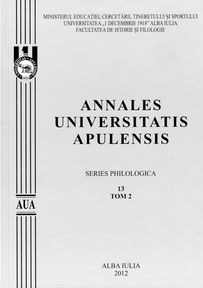Vocabulary and Reading Comprehension
Vocabulary and Reading Comprehension
Author(s): Alexandra Valeria PopescuSubject(s): Foreign languages learning
Published by: Universitatea »1 Decembrie 1918« Alba Iulia
Keywords: reading comprehension; vocabulary acquisition; ESP
Summary/Abstract: English is the most used foreign language in the world. It is the language in which more and more people read and write nowadays. Reading in English is a very useful tool to have access in a very wide range of literature. Reading in English helps everyone to understand the world better. Reading is a complex cognitive process which depends upon a number of “ingredients” all working together in a synchronous and even automatic way. These components include: phonemic awareness, phonics and word study, vocabulary and comprehension. On the one hand vocabulary clearly plays a critical role in understanding what has been read but on the other hand comprehension is far more than recognizing words and remembering their meaning. However, if a student does not know a certain proportion of the words in the text, comprehension is impossible. Vocabulary experts agree that reading comprehension depends on a student already knowing between 90 and 95 percent of the words in a text. Thus the reader is able to get the main idea from the reading and also to guess correctly what many of the unfamiliar words mean which helps him /her learn new words. In addition the reader should be intentional and thoughtful while reading, and ready to apply reading comprehension strategies as ways to be sure that what is being read matches his / her expectations. Comprehension always attends to what is coded or written in the text, but it also depends upon the reader’s background experiences, purposes, feelings and needs of the moment. That is why we can read the same text or book twice and it will have different meanings for us. In other words we, as readers, are an equal and active partner with the author of the text in the meaning-making process of comprehension. The present paper refers to the impact of the general vocabulary knowledge and the specific vocabulary on reading comprehension abilities of the technical faculties’ students. ESP students’ poor reading comprehension performance has been attributed to different variables such as non satisfactory or incorrect knowledge of vocabulary or grammar and little familiarity with reading comprehension strategies. Reading is necessary and of great importance when students have to develop their professional studies. Consequently, the students of technical universities need both good reading skills for acquiring knowledge and new information and a large and rich vocabulary. One of the main problems confronting the English for Specific Purposes (ESP) teachers is how to improve their reading comprehension achievement.
Journal: Annales Universitatis Apulensis. Series Philologica
- Issue Year: 13/2012
- Issue No: 2
- Page Range: 531-540
- Page Count: 9
- Language: English

